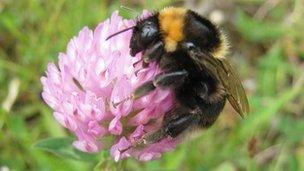How UK's humble bee project led to Swedish outrage
- Published

The scientists plan to collect 100 bees
It all sounded so promising when UK scientists announced "exciting" plans to collect 100 bees from Sweden.
The bombus subterraneus or short-haired bumblebee has been extinct in Britain for a quarter of a century.
Conservationists planned to travel to Skåne province, in southern Sweden, to collect bumblebee queens for release in a Kent nature reserve.
But a "misunderstanding" led to Swedes reacting in anger to the plans to take their bees.
The international argument is now thought to have been resolved but how did it happen in the first place?
The project to reintroduce bees to Britain involves Natural England, the Bumblebee Conservation Trust, RSPB and Hymettus - an insect conservation charity.
'Bumblebee thieves'
With such well-regarded backers it all started so well.
When news of the scheme was first announced it was heralded in the British media as a " <link> <caption>groundbreaking project</caption> <url href="http://www.countrylife.co.uk/news/country/article/529848/Bumblebee-back-in-Britain-after-24-years.html" platform="highweb"/> </link> ".
Dr Pete Brotherton, head of biodiversity at Natural England, said: "We are really excited about their return to England - these bees belong in our countryside and it'll be great to have them back."

It is not thought Swedish-British foreign relations have been damaged
But it was not viewed in such enthusiastic terms in the bees' homeland.
Headlines such as "Skåne bumblebees at risk of extinction", "Bumblebees set for export stir up emotions" and "'The bumblebee thieves' had permission" were used in news reports across the country.
Dagen Nyheter, one of Sweden's two national daily broadsheets, reported Skåne's bees risked extinction if the project went ahead.
The newspaper <link> <caption>reported</caption> <url href="http://www.dn.se/nyheter/sverige/britter-vill-ha-svenska-humlor" platform="highweb"/> </link> Annelie Johansson, environment director of Skåne County Administrative Board (local authority), said: "If they succeed, we will have hardly any left.
"The range of the short-haired bumblebee is decreasing and it is becoming more and more rare.
"If they take 100 queen bees from here, there is a big risk that we end up in the same situation as the UK, that it becomes extinct."
She added Sweden had no legal right to stop the scientists because the bees were no longer on Sweden's "red-list" of critically threatened animals so their only option was to plead for understanding.
But Lars-Åke Janzon, a retired biologist from the National Museum of Natural History in Stockholm, thought the people of Skåne should do more than plead.
He said: "They (the British) are no longer the rulers of the world they used to be when they just travelled around and took things. Nowadays they have to respect the country they come to."
'No lasting sting'
As the buzz in the Swedish press increased, the project co-ordinators issued a further press release to the Swedish media explaining they had all the necessary permits and permissions from the relevant Swedish authorities.
It seems while they had the approval of the Swedish Board of Agriculture, the Skåne County Administrative Board's environmental director was not aware of the project.
The scientists have now offered to meet the residents of Skåne and explain the project to them.
And the swarm of coverage may be dying down.
The Local, a website which presents European news in English, also reported on Swedish anger over the " <link> <caption>UK bumblebee push</caption> <url href="http://www.thelocal.se/40538/20120429/" platform="highweb"/> </link> ".
David Lander, editor of the Swedish news section of the site, said: "It's gone off the media radar now but there was outrage in certain quarters with biologists and conservationists accusing the UK of meddling (with Swedish bees).
"There's no more buzz about it now though and there will be no lasting sting in Swedish-British relations."
- Published2 May 2012
- Published26 April 2012
- Published10 October 2011